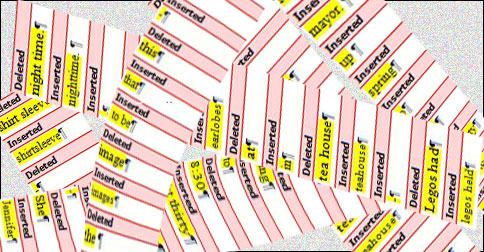CONTENTS

Now, however, it’s time to confess what all the editing, spell and grammar check, reading aloud and rereading in the world didn’t find: 114 mistakes in 90K+ words, or one every third page or so. Enough for any seasoned reader to feel the book was “riddled” with them.
Why I Need Proofreaders
Let me clarify about “mistakes”:
- I should have known better (ladies’ room, stationery/ary, capital/ol)
- I know better but my fingers typed something else (then/than, of/have, etc.)
- New rule, now I know better and let’s hope I remember (comma removal, capitalization)
What’s the Righter or Wronger Way?
As a reader educated in the 1960s and 70s, my eyes are not the universal arbiter of what “looks wrong” for all or even most readers. For example, I personally cannot get past the fact that there’s no longer a hyphen in time. “See you at eight thirty,” looks like there’s a missing hyphen to me and always will. While I have worked hard to retrain my fingers, I still missed a few and the proofers caught them.
I have thrown in the towel with hyphenation and in some cases capitalization. Even different, authoritative dictionaries don’t agree. Sure, go find a definitive list of wine capitalization. Thank goodness for proofreaders – but not for their knowledge of the publisher’s house style and the Chicago Manual. Thank goodness for proofreaders because CONSISTENCY.
Whether the reader sees one or the other as right is secondary to my more certain knowledge that inconsistency will be regarded by more people as sloppiness. That is, consistently “wrong” in their eyes is better than getting it both “right” and “wrong” throughout a single novel. The former a reader might put down to stylesheet or regional rules. The latter is unprofessional, which is the last thing I want a reader to think when I’ve asked her for money and time in exchange for my work.

My Personal Bad Habit
After comparing the version I submitted to typeset and the version I received for final author review (thank you MS Word) I have the proofreader’s feedback: Seriously, Karin, get a grip on the compound, hyphenated or neither words and phrases.
earlobe, tea house, night time, wastebasket, wine glass
light-headed, candle light, Superbowl, backseat
ladyfinger, fall back plan, tick tock, lap dog, semi-circle
Do you know which of these are right or wrong? Apparently neither did I. More than 90 of the 114 fixes were of this type.
That, gentle readers, is why there are professional proofreaders. There is little hope that I’ll remember most of these words or phrases correctly, but at least I have had that prod to the backside: when in doubt, look it up!
My Street Cred is Saved by Proofreaders
As with editors, proofreaders always find one thing that would have been simply embarrassing to have been in the final work. For Captain of Industry, my editor kept me from transmogrifying a character into a slab of concrete (she turned into a driveway).
The Jedi proofreaders fixed my misspelling of “Alderaan.” Because it was on like Alderaan, bee-yotch.

